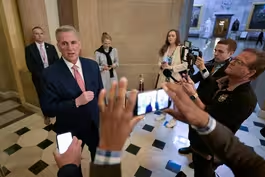
Brooks and Capehart on what led to a government shutdown
Clip: 9/29/2023 | 11m 44sVideo has Closed Captions
Brooks and Capehart on why a government shutdown could last a long time
New York Times columnist David Brooks and Washington Post associate editor Jonathan Capehart join Amna Nawaz to discuss the week in politics, including the country barreling toward a government shutdown and the first hearings in House Republicans' impeachment inquiry of President Biden.
Problems playing video? | Closed Captioning Feedback
Problems playing video? | Closed Captioning Feedback
Major corporate funding for the PBS News Hour is provided by BDO, BNSF, Consumer Cellular, American Cruise Lines, and Raymond James. Funding for the PBS NewsHour Weekend is provided by...

Brooks and Capehart on what led to a government shutdown
Clip: 9/29/2023 | 11m 44sVideo has Closed Captions
New York Times columnist David Brooks and Washington Post associate editor Jonathan Capehart join Amna Nawaz to discuss the week in politics, including the country barreling toward a government shutdown and the first hearings in House Republicans' impeachment inquiry of President Biden.
Problems playing video? | Closed Captioning Feedback
How to Watch PBS News Hour
PBS News Hour is available to stream on pbs.org and the free PBS App, available on iPhone, Apple TV, Android TV, Android smartphones, Amazon Fire TV, Amazon Fire Tablet, Roku, Samsung Smart TV, and Vizio.
Providing Support for PBS.org
Learn Moreabout PBS online sponsorshipAMNA NAWAZ: It's been a hectic week in Washington, as the country barrels toward a government shutdown and hearings begin in House Republicans' impeachment inquiry of President Biden.
We turn now to the analysis of Brooks and Capehart.
That is New York Times columnist David Brooks and Jonathan Capehart, associate editor for The Washington Post.
Welcome.
Good to see you.
JONATHAN CAPEHART: Hi, Amna.
DAVID BROOKS: Good to see you.
AMNA NAWAZ: Well, let's start with the shutdown, because we are, as Lisa reported earlier, hurtling towards another government shutdown.
And, Jonathan, they have become more commonplace in recent history.
We are here not because two parties don't agree, but because Republicans can't agree amongst themselves.
Could this have been avoided?
JONATHAN CAPEHART: No.
And it's not Republicans arguing amongst themselves.
It's House Republicans arguing amongst themselves.
It was fascinating to see that clip that Lisa played of the speaker yelling, saying, do you want me to surrender to the Senate?
As an American, yes, please, surrender to the Senate.
Why?
Because, over in the Senate, there's a bipartisan effort at a continuing resolution with Republicans and Democrats coming together.
They're supposed to vote tomorrow.
And, hopefully, it will vote out and put pressure on the speaker to take yes for an answer and keep the government open.
But the speaker has been in thrall to the MAGA minority within his majority that has been able to scuttle rule votes, scuttle continuing resolution votes, and not just by one or two votes.
The last vote they just did, 21 Republicans voted it down.
So, I -- yes, we're going to a shutdown.
It was inevitable.
The key question is, for how long will this shutdown last?
AMNA NAWAZ: David, what is Speaker McCarthy's strategy here?
To Jonathan's point, it seems to be to placate that minority of far right Republicans so far.
DAVID BROOKS: Yes, I really don't -- I have trouble seeing how this ends, because, in theory, it would end when he did a deal with Democrats and they got Republicans and Democrats together.
But that seems to be an impossibility.
So this really could go on a long time.
And, to me, it's the -- I wouldn't say it's inevitable, but to find the fork in the road that led us to this spot, I'd go back to the 1990s and back to Newt Gingrich, where you really had the beginning of departure -- of make-believe departure from reality.
And compared to today's crew, Newt Gingrich looks like Plato and Socrates, because they actually had a plan.
They wanted to cut government spending, and they had a plan to cut.
And John Kasich, and -- who was then in the House, wanted to cut government spending.
Here was the things he wanted to cut.
These guys today, they have no plan.
They're not going to touch taxes.
They're not going to touch entitlements.
They're -- it's just all make-believe.
And it's a lesson that, once you start pretending to other people, you end up lying to yourself.
And so I think they firmly believe they're doing something constructive here, and I have sympathy with the idea that the deficits are too big.
They're just not serious, and they have taken flight from reality, and it's become make-believe.
AMNA NAWAZ: Lisa did a wonderful job of touching on a few of the potential impacts here, because we talk about shutdowns like it's a political problem, but this -- it hits home in people's communities and in their lives.
And we know we have seen White House economists and private banks come out with the kind of estimates that say, oh, we could see reduced growth and so on.
But, Jonathan, how are you looking at the potential impact of this?
What does this mean?
JONATHAN CAPEHART: Well, I think when people think of shutdowns, they think of national parks being closed.
On my way here, I saw the bicycle fencing going up around the Lincoln Memorial, because that will be closed if the government shuts down.
But if you look at the -- there's a private Facebook group called FedFam.
And it was started, full disclosure, by a friend of mine during the 2019 government shutdown, which is the longest government shutdown in history.
And it was federal workers pooling their resources together in terms of information about where to get food, where to get assistance, some people offering help, most people looking for help.
That Facebook group now has more than 30,000 members.
And over the weeks leading up to what is possibly -- what is going to happen tomorrow, they have been gaining 200, 300 new members a day.
They're -- folks like to rip Washington, talk about the bureaucrats, these faceless bureaucrats are doing this or doing that.
These are real people who are among the American people who live paycheck to paycheck.
And a lot of those federal workers, yes, some will get back pay once they're able -- once the government reopens.
But a lot of them are contractors who will not be repaid.
And I'm thinking about cafeteria workers.
AMNA NAWAZ: David, the economists seem to agree that the economy is strong enough right now that a short-term shutdown would not do much lasting damage.
The longer, of course, it goes on, the more potential damage it could inflict.
But when you look at this fact that this economic context today is very different from the years of shutdowns past, right, there's a number of different headwinds at hand.
You have got autoworkers still on strike.
You have got the restarting of federal student low payments next month as well.
Are Republicans you talk to, are they worried that this could actually critically hurt the economy the longer it goes down?
DAVID BROOKS: Some of them are.
I mean, the Republicans are genuinely divided on this, and it's a mystery to me why they can't find a strategy, the way forward.
Gas prices are also shooting up.
AMNA NAWAZ: Yes.
DAVID BROOKS: And there was a study that found that it would cut GDP 0.2 percent per week.
So that doesn't sound like a lot, but you add up a bunch of weeks, and that really does begin to sound like a lot.
And then there's the psychological effect on how businesses feel comfortable, how much consumer confidence there is.
And we're at that moment.
People have been predicting a recession for like a year-and-a-half, and we have been fortunate to avoid it.
But we're now at the precarious moment where it seemed before all this that we could slip into it, so that could happen.
And then the other blow, aside from, yes, we should focus on the WIC people you and Lisa talked about, people who are really vulnerable and just need support.
But then there's the overarching matter of public trust.
The Republican Party used to be the party, you weren't thrilled by them, but they were the business party.
They knew how to run things.
And that seems like eons or light years ago.
And so one of the things that's bound to sow distrust in institutions, distrust in government is stopping your work in the middle of nothing.
Like, that's what's going to happen.
And so the blow to public cynicism, the increase in public cynicism, the blow to public distrust, those are psychological things that will just cause more people to be even more contemptuous of government.
AMNA NAWAZ: Speaking of the Republican Party, there are three events this week I want to get both of your takes on that kind of give us insight into where the party is right now in the larger moment in political history.
We had, of course, the top seven Republican candidates for president participating in the second debate in California.
The stage did not include the leading candidate, Donald Trump, who held a rally in Michigan instead addressing autoworkers.
And then, on Thursday, House Republicans held their first public hearing for the impeachment inquiry into President Biden, where no new evidence was presented linking him to any impeachable offense.
Jonathan, what do all of these pull together kind of tells us about where the party is and its priorities?
JONATHAN CAPEHART: There's a GIF that I love to use for moments like these, and it is a dumpster on fire.
That is -- literally, that is what the Republican Party is.
You look at what we're talking about in terms of the shutdown, no leadership from the Republican speaker of the House to prevent a government shutdown.
On the other side, you have the Republican chairman of the House Oversight Committee leading a sham impeachment inquiry where their own witnesses came in and said, there's no evidence here yet.
And then, on that debate stage, a debate that I tuned into and turned away from because I couldn't understand what anyone was saying because everyone's talking over each other.
And what I could hear was offensive on so many levels.
And then, on top of that, a leading member - - the leading candidate by 43 points in the latest NBC News poll above Ron DeSantis, has four indictments and 91 counts in four different jurisdictions.
The Republican Party is either aimless when it comes to governing, or it's going down the road to autocracy when it comes to the presidential level.
And, quite honestly, as an American, that breaks my heart, because this country has been run on a two-party system, but it requires two strong parties.
And, right now, there's only one.
AMNA NAWAZ: David, how do you look at it?
DAVID BROOKS: Well, I agree with a lot of what Jonathan said, except for we only have one strong party, because this is working for them.
All the stuff you mentioned, that's totally working for them.
To me, one of the symptomatic moments of this week was a story in my paper today.
The Club for Growth is a very conservative, sort of libertarian, free market, Republican, conservative outfit that has been spending millions of dollars to run ads against Donald Trump.
And a document, their own internal document was leaked.
And it turns out they found that those ads are doing nothing, that Donald Trump, some of the ads, if they mention January 6, it helps Donald Trump.
And so I think the upshot of that is that this is Donald Trump's party, Donald Trump's party more than ever before.
And it's also true that he is politically stronger than he's ever been before, in a political sense.
So he -- The Washington Post poll was an outlier, but he was leading Joe Biden by a chunk.
And so we have to think seriously about why is what they're doing working?
Because by what I know, and by my own aesthetic and moral sensibility, it should not be working.
And the Republican donor class is now in a panic to try to lure Governor Glenn Youngkin from Virginia into the race, which is just fantasyland.
Like, what does Glenn Youngkin bring that Nikki Haley doesn't bring?
It's not finding some magic figure who can take down Donald Trump.
It's Donald Trump's party.
And it's working.
And so that - - well, that's a scary thing, frankly.
JONATHAN CAPEHART: Mm-hmm.
AMNA NAWAZ: Look, before we go, in the minute-or-half or so, we have left, I did want to ask each of you if you wanted to say something brief on the passing of Senator Dianne Feinstein, an absolute giant, an icon in politics and the Senate.
David?
DAVID BROOKS: Yes, I learned from the obituaries today how -- what a rough childhood she had.
She had a mom who had some mental health issues, flew into sulfuric rages, and what a hard childhood she had.
And then, even up to age 45, her political career looked to be over.
But that childhood had prepared her with a resilience to be tough at the horrible moment in San Francisco when the mayor was and the councilmember were killed.
And it enabled her to be tough in the Senate.
The one thing we all knew about Dianne Feinstein is, she was a very tough person.
I saw a Willie Brown quote from California.
He said, she shouldn't be a politician.
She doesn't play any games.
She's just direct.
(LAUGHTER) DAVID BROOKS: And that is -- that was true of Dianne Feinstein.
AMNA NAWAZ: Jonathan?
JONATHAN CAPEHART: Senator Feinstein really came into my consciousness in '92, when she was elected in the -- quote -- "year of the woman," part of that vanguard of women in the Senate.
And then she was at pivotal moments in our history, the Clarence Thomas hearings, the investigation into torture.
Yes, she was tough as nails.
She was an excellent senator.
She was also someone who was sort of a moral rock and a conscience.
She was -- and she was a centrist, and not willing to be swayed one way or another, but was willing to talk and work and compromise, because she took governing seriously.
We lost a giant in American government.
AMNA NAWAZ: So many have followed in her footsteps as well.
Our thoughts are with her family and loved ones.
Jonathan Capehart, David Brooks, great to see you.
Thank you.
JONATHAN CAPEHART: Thanks, Amna.
DAVID BROOKS: Good to see you.
JONATHAN CAPEHART: You too.
Cheech Marin helps open showcase of Chicano art and culture
Video has Closed Captions
Clip: 9/29/2023 | 7m 39s | Actor Cheech Marin helps open permanent showcase of Chicano art and culture (7m 39s)
How a shutdown will impact government agencies and programs
Video has Closed Captions
Clip: 9/29/2023 | 7m 16s | How the looming shutdown will impact government agencies and programs (7m 16s)
A look at the retailers blaming crime as they close stores
Video has Closed Captions
Clip: 9/29/2023 | 7m 31s | As retailers close stores due to shoplifting, are the concerns real or overblown? (7m 31s)
Remembering Dianne Feinstein and her trailblazing career
Video has Closed Captions
Clip: 9/29/2023 | 12m 11s | Remembering Sen. Dianne Feinstein and her trailblazing career (12m 11s)
Providing Support for PBS.org
Learn Moreabout PBS online sponsorship
- News and Public Affairs

FRONTLINE is investigative journalism that questions, explains and changes our world.

- News and Public Affairs

Amanpour and Company features conversations with leaders and decision makers.












Support for PBS provided by:
Major corporate funding for the PBS News Hour is provided by BDO, BNSF, Consumer Cellular, American Cruise Lines, and Raymond James. Funding for the PBS NewsHour Weekend is provided by...



